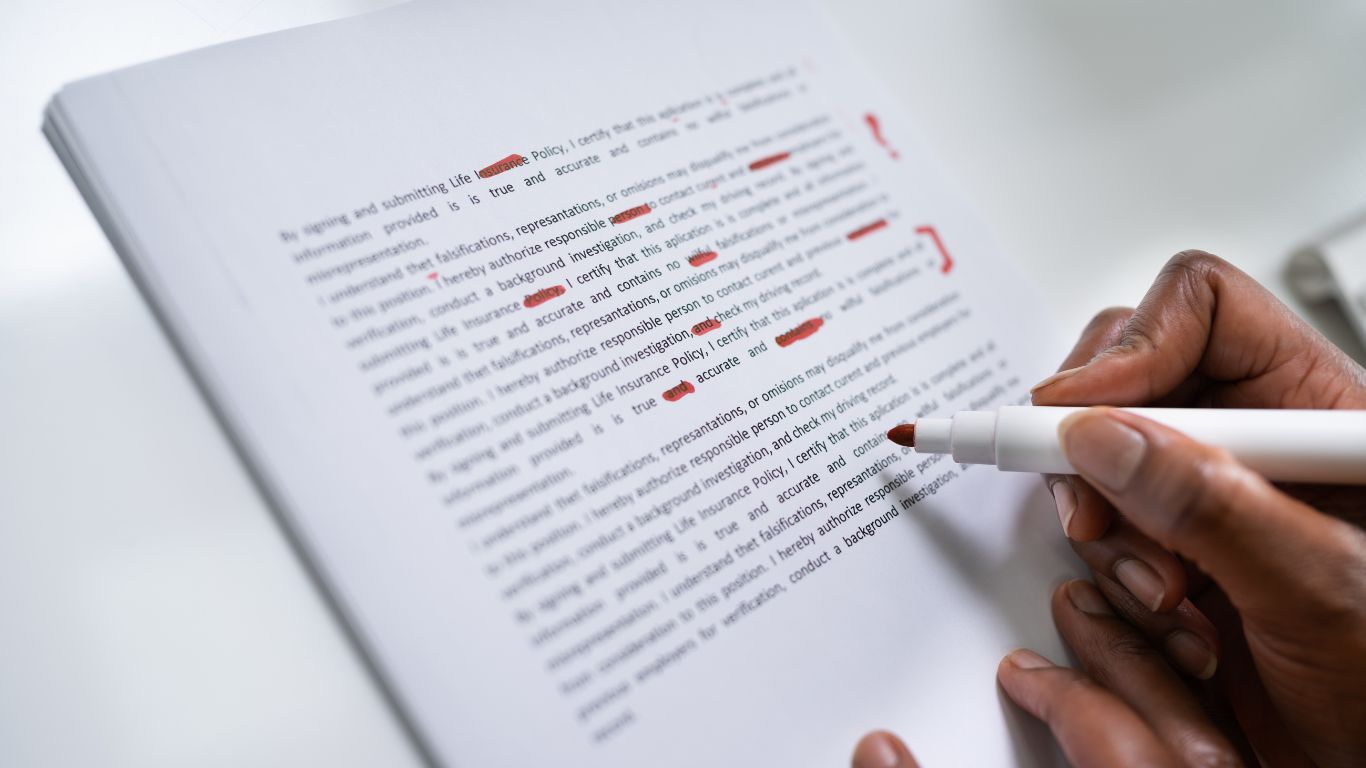Academic writing serves as the foundation of scholarly communication, allowing researchers, dissertation writers, and students to share their knowledge and insights with a broader audience. It is an essential part of our academic career and professional life. However, even the most brilliant ideas can be undermined by grammatical errors, no matter how well-versed the writer is.
These common mistakes, which often go unnoticed in research paper writing format, can hinder clarity and impact the overall quality of the work. Here we will explore some of the most prevalent grammatical errors in academic writing while offering effective solutions to avoid them:
Subject-Verb Agreement:
If you have ever run a piece of writing through AI software to check for basic grammatical errors, subject-verb agreement will likely rule them all. This error occurs when the subject and verb in a sentence do not match in number. For instance, using a singular verb with a plural subject or vice versa.
There is no specific reason for it to be among the most common grammatical errors. To avoid this, writers and creative writing services must pay careful attention to the number of their subjects and ensure that the verb agrees with it appropriately.
Misplaced or Dangling Modifiers:

Misplaced modifiers are often responsible for confusing or ambiguous sentences. They occur when a modifier is not placed next to the word or phrase intended to modify.
To rectify this issue, writers should ensure that modifiers are placed close to the words they are modifying, providing clarity and precision in their writing.
Dangling modifiers occur when the modified word or phrase is not explicitly stated in the sentence. This creates confusion and disrupts the logical flow of ideas. Writers should ensure that modifiers are clearly connected to the appropriate subject or object, ensuring coherence and engagement in their writing.
It is one of the common grammatical errors in English that can be sorted while proofreading your writing to ensure a seamless flow of content for the readers.
Word Choice and Confusion:

In academic writing, accuracy in word choice is vital. The choice of words can significantly influence the content’s clarity, coherence, and effectiveness. However, with its vast vocabulary, English can be confusing even for experienced writers. The recurrent word choice errors and confusions include:
- Homophones are words that sound alike but have different meanings and spellings. These are tricky to use, and some of them, such as “their” and “there,” “its” and “it’s,” or “your” and “you’re,” can easily confuse the writer and the reader alike. Consulting dictionaries and proofreading with extra vigilance can save the day for the writers. Slow down a little when using homophones!
- English words often have multiple forms that convey different grammatical functions or meanings. For example, the terms “affect” and “effect” can cause confusion. “Affect” is primarily used as a verb, while “effect” is typically a noun. To avoid these typos and grammatical errors, writers must familiarize themselves with their correct usage.
- Using diverse vocabulary is necessary for academic writing; however, you must be careful while using synonyms. Choosing the wrong synonym can alter a sentence’s intended meaning or context. For example, the usage of “discover” and “invent.” “Discover” implies finding something already existing, while “invent” means creating something new. Writers should be cautious with synonym substitution.
- Academic writing often includes complex concepts and specialized terminology. While using appropriate technical jargon to demonstrate expertise is crucial, overuse or improper application can disengage the readers or lead to misunderstandings. Writers should provide sufficient explanations and definitions of technical terms, especially when addressing a diverse audience. Be clearer and more precise simultaneously; it isn’t difficult but requires some experience and expertise.
- Ambiguity and vagueness can weaken the impact of an academic piece. Writers should be vigilant to avoid vague language, such as using overly general terms like “many,” “things,” or “stuff.” Instead, use concrete nouns, descriptive adjectives, and accurate data to avoid common grammatical errors in writing.
Run-on Sentences:
Run-on sentences are lengthy, complex structures that lack proper punctuation or coordination. They occur when two or more independent clauses are joined without the necessary punctuation or conjunctions.
To resolve this, writers should use appropriate punctuation (comma or semicolon, whichever is required) to break the sentence into shorter, more coherent units.
Moreover, it will be better to avoid long sentences and save your writing from these types of grammatical errors.
Comma Splices:

Correct punctuation can be a tricky affair for writers and result in comma splices. It happens when two independent clauses are improperly joined using only a comma. This creates division and disrupts the flow of ideas. To fix this error, writers should use a coordinating conjunction (e.g., and, but, or) or employ a semicolon to connect the clauses effectively.
Lack of Parallelism

Parallelism refers to the balanced structure of words, phrases, or clauses within a sentence. A lack of parallelism can result in awkward sentences and unclear writing. Writers should ensure that items in a list or series have consistent grammatical structures to maintain parallelism and enhance readability.
Pronoun-Antecedent Agreement:
Pronoun-antecedent agreement errors occur when the pronoun (e.g., He, she, it, this) used in a sentence does not agree in number, gender, or person with its antecedent (the word it refers to).
Moreover, the pronoun should refer to the antecedent explicitly to avoid creating ambiguity for the readers. Writers must ensure that pronouns and their antecedents are clearly aligned.
Wrongly Integrated Quotes:
Quotations and references from authentic academic sources are the essence of academic writing and validate the professionalism and expertise of the writer. There are many ways to include direct/indirect quotes in your content.
You must ensure the logical and proper integration of quotes to let them fulfill their purpose effectively. They should preferably be introduced rather than landing abruptly. Moreover, citing them correctly and using the required punctuation is the key!
Spelling Mistakes:

In academic writing, precision and attention to detail are highly needed. Spelling mistakes disturb the flow of ideas, project a lack of professionalism, and can undermine the writer’s credibility. To ensure the quality and impact of academic writing, it is vital to avoid spelling mistakes.
Readers can easily become confused or lose confidence in the writer’s abilities when confronted with misspelled words. These errors interrupt the natural reading flow and may force readers to pause and interpret the intended meaning.
Read the document carefully, and pay close attention to each word. Look out for commonly misspelled words and rely on spelling and grammar tools or dictionaries when doubtful.
Missing Words:
When writing in a flow and inscribing your train of thought, you are likely to miss words in your sentences, whether you are writing by hand or typing. Sometimes, using an AI tool doesn’t bring that mistake to the forefront. You must read the whole content thoroughly to rectify this commonly occurring error.
Abrupt Transition:
Academic writing calls for well-structured ideas and coherence throughout the content. Readers require a continuous flow to understand the implied concepts smoothly. You cannot just switch abruptly between one thing and the other, even if you are switching to a new paragraph.
To avoid abrupt transitions between the paragraphs, consider using terms such as, moreover, however, besides, similarly, likewise, etc. As an academic writer, you should never assume that readers already know this. Therefore, you are responsible for bridging the gap between clarity in your thoughts and their imprinting in writing.
Why Do You Need to Be Pro at Academic Writing?
We cannot emphasize enough how essential academic writing is for your professional career. It is, so far, the best medium for storing all intellectual and scholarly knowledge. Owing to the role it plays, it needs to be perfect.
Being an academic writer, you will experience a boost in your critical thinking and analytical skills. It requires you to analyze complex ideas, evaluate evidence, and construct logical arguments. The whole process enables you to bring clarity and organization to your thoughts and manifest it all in its finest form.
Moreover, academic writing is a medium for effective communication and collaboration within academic communities. It allows researchers and scholars to participate in scholarly conversations, respond to existing research, and propose new theories or methodologies. Clear and precise academic writing fosters the exchange of ideas, promotes constructive debates, and encourages intellectual growth through valuable feedback and peer review.
Conclusion
Mastering the art of academic writing requires not only extensive knowledge but also a keen eye for grammatical accuracy. By recognizing and correcting common grammatical errors such as subject-verb agreement, misplaced modifiers, run-on sentences, comma splices, lack of parallelism, pronoun-antecedent agreement, word choice confusion, and dangling modifiers, writers can enhance the clarity, impact, and overall quality of their work.
Engaging in continuous learning, seeking feedback, and practicing proofreading techniques will help you hone your writing skills. However, do not lose motivation to excel as an academic writer if your writing has recurrent grammatical errors. Instead, focus on learning more about them and correcting them later.
Practice will eventually make you perfect!


